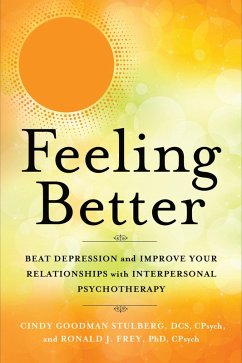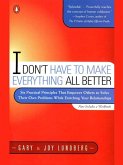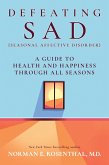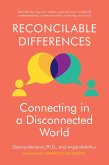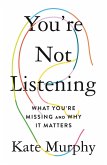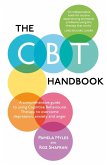Cindy Goodman Stulberg, Ronald J. Frey
Feeling Better (eBook, ePUB)
Beat Depression and Improve Your Relationships with Interpersonal Psychotherapy
8,95 €
8,95 €
inkl. MwSt.
Sofort per Download lieferbar

4 °P sammeln
8,95 €
Als Download kaufen

8,95 €
inkl. MwSt.
Sofort per Download lieferbar

4 °P sammeln
Jetzt verschenken
Alle Infos zum eBook verschenken
8,95 €
inkl. MwSt.
Sofort per Download lieferbar
Alle Infos zum eBook verschenken

4 °P sammeln
Cindy Goodman Stulberg, Ronald J. Frey
Feeling Better (eBook, ePUB)
Beat Depression and Improve Your Relationships with Interpersonal Psychotherapy
- Format: ePub
- Merkliste
- Auf die Merkliste
- Bewerten Bewerten
- Teilen
- Produkt teilen
- Produkterinnerung
- Produkterinnerung

Bitte loggen Sie sich zunächst in Ihr Kundenkonto ein oder registrieren Sie sich bei
bücher.de, um das eBook-Abo tolino select nutzen zu können.
Hier können Sie sich einloggen
Hier können Sie sich einloggen
Sie sind bereits eingeloggt. Klicken Sie auf 2. tolino select Abo, um fortzufahren.

Bitte loggen Sie sich zunächst in Ihr Kundenkonto ein oder registrieren Sie sich bei bücher.de, um das eBook-Abo tolino select nutzen zu können.
Beat Depression and Improve Your Relationships When it comes to treatment for depression, we have been getting it all wrong. Instead of focusing on just the biochemistry, we need to focus on the importance of relationships. Feeling Better offers a step-by-step guide using a research-proven approach called interpersonal psychotherapy, or IPT, which can help you deal with the issues that may be contributing to your unhappiness. Therapists Cindy Stulberg and Ron Frey have used IPT with clients for more than twenty years and achieved dramatic, lasting results after only eight to twelve weeks. They…mehr
- Geräte: eReader
- mit Kopierschutz
- eBook Hilfe
- Größe: 1.77MB
Andere Kunden interessierten sich auch für
![I Don't Have to Make Everything All Better (eBook, ePUB) I Don't Have to Make Everything All Better (eBook, ePUB)]() Gary LundbergI Don't Have to Make Everything All Better (eBook, ePUB)7,99 €
Gary LundbergI Don't Have to Make Everything All Better (eBook, ePUB)7,99 €![Calling the Circle (eBook, ePUB) Calling the Circle (eBook, ePUB)]() Christina BaldwinCalling the Circle (eBook, ePUB)3,99 €
Christina BaldwinCalling the Circle (eBook, ePUB)3,99 €![Defeating SAD (Seasonal Affective Disorder) (eBook, ePUB) Defeating SAD (Seasonal Affective Disorder) (eBook, ePUB)]() Norman E. Rosenthal M. D.Defeating SAD (Seasonal Affective Disorder) (eBook, ePUB)9,95 €
Norman E. Rosenthal M. D.Defeating SAD (Seasonal Affective Disorder) (eBook, ePUB)9,95 €![Reconcilable Differences (eBook, ePUB) Reconcilable Differences (eBook, ePUB)]() Dawna MarkovaReconcilable Differences (eBook, ePUB)9,95 €
Dawna MarkovaReconcilable Differences (eBook, ePUB)9,95 €![Healing through the Dark Emotions (eBook, ePUB) Healing through the Dark Emotions (eBook, ePUB)]() Miriam GreenspanHealing through the Dark Emotions (eBook, ePUB)14,95 €
Miriam GreenspanHealing through the Dark Emotions (eBook, ePUB)14,95 €![You're Not Listening (eBook, ePUB) You're Not Listening (eBook, ePUB)]() Kate MurphyYou're Not Listening (eBook, ePUB)8,95 €
Kate MurphyYou're Not Listening (eBook, ePUB)8,95 €![The CBT Handbook (eBook, ePUB) The CBT Handbook (eBook, ePUB)]() Pamela Myles-HootonThe CBT Handbook (eBook, ePUB)3,99 €
Pamela Myles-HootonThe CBT Handbook (eBook, ePUB)3,99 €-
-
-
Beat Depression and Improve Your Relationships When it comes to treatment for depression, we have been getting it all wrong. Instead of focusing on just the biochemistry, we need to focus on the importance of relationships. Feeling Better offers a step-by-step guide using a research-proven approach called interpersonal psychotherapy, or IPT, which can help you deal with the issues that may be contributing to your unhappiness. Therapists Cindy Stulberg and Ron Frey have used IPT with clients for more than twenty years and achieved dramatic, lasting results after only eight to twelve weeks. They have now created this accessible, first-of-its kind guide. Feeling Better teaches skills and tools that will allow you to set and achieve goals, articulate feelings, and make constructive decisions. You'll learn to identify and engage with allies and supporters, deal with difficult people, and, if need be, walk away from harmful relationships. Cindy and Ron have taught clients - diagnosed with depression or not - to use these skills in virtually every life situation, from preventing divorce to "consciously uncoupling," raising healthy children, coping with loss, and dealing with addiction. Writing with wisdom, warmth, and humor, they are savvy coaches and inspiring cheerleaders who can offer a lifeline to the depressed and life enrichment to anyone.
Dieser Download kann aus rechtlichen Gründen nur mit Rechnungsadresse in A, D ausgeliefert werden.
Produktdetails
- Produktdetails
- Verlag: New World Library
- Seitenzahl: 304
- Erscheinungstermin: 20. November 2018
- Englisch
- ISBN-13: 9781608685691
- Artikelnr.: 54287867
- Verlag: New World Library
- Seitenzahl: 304
- Erscheinungstermin: 20. November 2018
- Englisch
- ISBN-13: 9781608685691
- Artikelnr.: 54287867
- Herstellerkennzeichnung Die Herstellerinformationen sind derzeit nicht verfügbar.
Cindy Goodman Stulberg, DCS, CPsych, is a psychologist, teacher, wife, mother, mother-in-law, and grandmother. With Dr. Ronald Frey, Cindy cofounded the Institute for Interpersonal Psychotherapy, which trains, supervises, and certifies mental health clinicians in interpersonal psychotherapy. She lives in Ontario.
Ronald J. Frey, PhD, CPsych, is a former acting chief psychologist for the Royal Canadian Mounted Police and a registered forensic and clinical psychologist. He lives in Quebec.
Ronald J. Frey, PhD, CPsych, is a former acting chief psychologist for the Royal Canadian Mounted Police and a registered forensic and clinical psychologist. He lives in Quebec.
Introduction: Get ready to feel better
True confession: I'm one of those people who skips introductions. I'm busy.
Just get me to the good stuff. This is your journey, so skip to Week 1 if
you like. But if you're interested in knowing more about us, the approach
that we use, and the four main characters we'll follow over the next 12
weeks, read on.
Week 1: What if you had a broken leg instead?
We spend our first week together discovering what depression is-and what it
isn't. (You might be surprised!) You'll learn why you may need to take a
temporary break from some of your activities and how to talk to the
important people in your life about what you're going through.
Week 2: Draw your social circle
This week we play detective, investigating the kind of relationships you
have and identifying what you wish was different about them. These
relationships (and how you handle them) hold the key to your mood. This
week's work will help open the door to a new world of possibilities with
the people in your life.
Week 3: Name that feeling
This week we help you make connections between your feelings and the
interactions you have with others. With practice, you'll become better at
naming your feelings, understanding where they come from, and choosing how
you want to handle them-with the end result of feeling better.
Week 4: Choose your own adventure
This week, we help you figure out which one of four problem areas you were
experiencing around the time you started to feel down or depressed.
Choosing a problem area will help you focus your efforts over the next few
weeks and give you specific steps to take to feel better. Added bonus: the
skills you learn can be applied to any future problem!
Week 5: Goal get 'em
This week, we help you set goals related to your problem area that you can
work on for the rest of the book. By making these goals SMART (specific,
measurable, achievable, relevant, and timely), and focusing your efforts on
achieving them, you'll build your confidence and prove that you have the
power to make yourself feel better.
Week 6: Mirror, mirror
This week is all about reflection. We start with a quick recap of
everything you've accomplished since Week 1. Then we help you take a closer
look at a recent incident that bothered you. By examining what happened and
exploring your feelings in a constructive way, you'll be learning a skill
that we'll build on in the weeks to come.
Week 7: Who can you share that with?
This week we help you share your feelings about your problem area and goals
with someone in your circle. You'll get advice on who to talk to,
suggestions for starting the conversation, and tips for getting the most
out of the encounter so you can experience first-hand the mood-boosting
power of interpersonal connection.
Week 8: Out with the old and in with the new
This week we help you change things up. We coach you through the steps:
choosing what to change, deciding what you want to do instead, coping with
the fear of the unknown, trying out your new approach, checking in on your
emotions afterwards, and sharing your experience with your "who." You can
make yourself feel better-and this week proves it.
Week 9: What did you expect?
Our expectations influence our feelings. This week we'll help you reflect
on your own expectations and imagine what another person's expectations
might be. Then, if it feels right, we'll coach you through having a
discussion to clarify expectations with someone in your life. With your new
understanding you can decide what you want to do to feel better.
Week 10: The rehearsal
Practice doesn't make perfect, but it can help us feel more prepared. This
week we give you some strategies for practicing an important conversation
or interaction so, come show time, you can choose an approach you've
rehearsed and be ready for what might happen.
Week 11: Just do it
You've done what you can to prepare, and now it's show time. This week, we
help you set realistic expectations for the interpersonal event that's
going to get you to your goal, give you some examples for inspiration, and
cheer you on from the sidelines. You've got this!
Week 12: Do your happy dance
It's our last week together, and time to celebrate what you've
accomplished. We'll help you reflect on what you've learned, recall who you
can rely on, and plan for future moments that may be stressful for you. If
you tried anything new over the last 12 weeks, you'll be feeling better-and
that's worth getting out your dancing shoes (and inviting someone to
dance)!
True confession: I'm one of those people who skips introductions. I'm busy.
Just get me to the good stuff. This is your journey, so skip to Week 1 if
you like. But if you're interested in knowing more about us, the approach
that we use, and the four main characters we'll follow over the next 12
weeks, read on.
Week 1: What if you had a broken leg instead?
We spend our first week together discovering what depression is-and what it
isn't. (You might be surprised!) You'll learn why you may need to take a
temporary break from some of your activities and how to talk to the
important people in your life about what you're going through.
Week 2: Draw your social circle
This week we play detective, investigating the kind of relationships you
have and identifying what you wish was different about them. These
relationships (and how you handle them) hold the key to your mood. This
week's work will help open the door to a new world of possibilities with
the people in your life.
Week 3: Name that feeling
This week we help you make connections between your feelings and the
interactions you have with others. With practice, you'll become better at
naming your feelings, understanding where they come from, and choosing how
you want to handle them-with the end result of feeling better.
Week 4: Choose your own adventure
This week, we help you figure out which one of four problem areas you were
experiencing around the time you started to feel down or depressed.
Choosing a problem area will help you focus your efforts over the next few
weeks and give you specific steps to take to feel better. Added bonus: the
skills you learn can be applied to any future problem!
Week 5: Goal get 'em
This week, we help you set goals related to your problem area that you can
work on for the rest of the book. By making these goals SMART (specific,
measurable, achievable, relevant, and timely), and focusing your efforts on
achieving them, you'll build your confidence and prove that you have the
power to make yourself feel better.
Week 6: Mirror, mirror
This week is all about reflection. We start with a quick recap of
everything you've accomplished since Week 1. Then we help you take a closer
look at a recent incident that bothered you. By examining what happened and
exploring your feelings in a constructive way, you'll be learning a skill
that we'll build on in the weeks to come.
Week 7: Who can you share that with?
This week we help you share your feelings about your problem area and goals
with someone in your circle. You'll get advice on who to talk to,
suggestions for starting the conversation, and tips for getting the most
out of the encounter so you can experience first-hand the mood-boosting
power of interpersonal connection.
Week 8: Out with the old and in with the new
This week we help you change things up. We coach you through the steps:
choosing what to change, deciding what you want to do instead, coping with
the fear of the unknown, trying out your new approach, checking in on your
emotions afterwards, and sharing your experience with your "who." You can
make yourself feel better-and this week proves it.
Week 9: What did you expect?
Our expectations influence our feelings. This week we'll help you reflect
on your own expectations and imagine what another person's expectations
might be. Then, if it feels right, we'll coach you through having a
discussion to clarify expectations with someone in your life. With your new
understanding you can decide what you want to do to feel better.
Week 10: The rehearsal
Practice doesn't make perfect, but it can help us feel more prepared. This
week we give you some strategies for practicing an important conversation
or interaction so, come show time, you can choose an approach you've
rehearsed and be ready for what might happen.
Week 11: Just do it
You've done what you can to prepare, and now it's show time. This week, we
help you set realistic expectations for the interpersonal event that's
going to get you to your goal, give you some examples for inspiration, and
cheer you on from the sidelines. You've got this!
Week 12: Do your happy dance
It's our last week together, and time to celebrate what you've
accomplished. We'll help you reflect on what you've learned, recall who you
can rely on, and plan for future moments that may be stressful for you. If
you tried anything new over the last 12 weeks, you'll be feeling better-and
that's worth getting out your dancing shoes (and inviting someone to
dance)!
Introduction: Get ready to feel better
True confession: I'm one of those people who skips introductions. I'm busy.
Just get me to the good stuff. This is your journey, so skip to Week 1 if
you like. But if you're interested in knowing more about us, the approach
that we use, and the four main characters we'll follow over the next 12
weeks, read on.
Week 1: What if you had a broken leg instead?
We spend our first week together discovering what depression is-and what it
isn't. (You might be surprised!) You'll learn why you may need to take a
temporary break from some of your activities and how to talk to the
important people in your life about what you're going through.
Week 2: Draw your social circle
This week we play detective, investigating the kind of relationships you
have and identifying what you wish was different about them. These
relationships (and how you handle them) hold the key to your mood. This
week's work will help open the door to a new world of possibilities with
the people in your life.
Week 3: Name that feeling
This week we help you make connections between your feelings and the
interactions you have with others. With practice, you'll become better at
naming your feelings, understanding where they come from, and choosing how
you want to handle them-with the end result of feeling better.
Week 4: Choose your own adventure
This week, we help you figure out which one of four problem areas you were
experiencing around the time you started to feel down or depressed.
Choosing a problem area will help you focus your efforts over the next few
weeks and give you specific steps to take to feel better. Added bonus: the
skills you learn can be applied to any future problem!
Week 5: Goal get 'em
This week, we help you set goals related to your problem area that you can
work on for the rest of the book. By making these goals SMART (specific,
measurable, achievable, relevant, and timely), and focusing your efforts on
achieving them, you'll build your confidence and prove that you have the
power to make yourself feel better.
Week 6: Mirror, mirror
This week is all about reflection. We start with a quick recap of
everything you've accomplished since Week 1. Then we help you take a closer
look at a recent incident that bothered you. By examining what happened and
exploring your feelings in a constructive way, you'll be learning a skill
that we'll build on in the weeks to come.
Week 7: Who can you share that with?
This week we help you share your feelings about your problem area and goals
with someone in your circle. You'll get advice on who to talk to,
suggestions for starting the conversation, and tips for getting the most
out of the encounter so you can experience first-hand the mood-boosting
power of interpersonal connection.
Week 8: Out with the old and in with the new
This week we help you change things up. We coach you through the steps:
choosing what to change, deciding what you want to do instead, coping with
the fear of the unknown, trying out your new approach, checking in on your
emotions afterwards, and sharing your experience with your "who." You can
make yourself feel better-and this week proves it.
Week 9: What did you expect?
Our expectations influence our feelings. This week we'll help you reflect
on your own expectations and imagine what another person's expectations
might be. Then, if it feels right, we'll coach you through having a
discussion to clarify expectations with someone in your life. With your new
understanding you can decide what you want to do to feel better.
Week 10: The rehearsal
Practice doesn't make perfect, but it can help us feel more prepared. This
week we give you some strategies for practicing an important conversation
or interaction so, come show time, you can choose an approach you've
rehearsed and be ready for what might happen.
Week 11: Just do it
You've done what you can to prepare, and now it's show time. This week, we
help you set realistic expectations for the interpersonal event that's
going to get you to your goal, give you some examples for inspiration, and
cheer you on from the sidelines. You've got this!
Week 12: Do your happy dance
It's our last week together, and time to celebrate what you've
accomplished. We'll help you reflect on what you've learned, recall who you
can rely on, and plan for future moments that may be stressful for you. If
you tried anything new over the last 12 weeks, you'll be feeling better-and
that's worth getting out your dancing shoes (and inviting someone to
dance)!
True confession: I'm one of those people who skips introductions. I'm busy.
Just get me to the good stuff. This is your journey, so skip to Week 1 if
you like. But if you're interested in knowing more about us, the approach
that we use, and the four main characters we'll follow over the next 12
weeks, read on.
Week 1: What if you had a broken leg instead?
We spend our first week together discovering what depression is-and what it
isn't. (You might be surprised!) You'll learn why you may need to take a
temporary break from some of your activities and how to talk to the
important people in your life about what you're going through.
Week 2: Draw your social circle
This week we play detective, investigating the kind of relationships you
have and identifying what you wish was different about them. These
relationships (and how you handle them) hold the key to your mood. This
week's work will help open the door to a new world of possibilities with
the people in your life.
Week 3: Name that feeling
This week we help you make connections between your feelings and the
interactions you have with others. With practice, you'll become better at
naming your feelings, understanding where they come from, and choosing how
you want to handle them-with the end result of feeling better.
Week 4: Choose your own adventure
This week, we help you figure out which one of four problem areas you were
experiencing around the time you started to feel down or depressed.
Choosing a problem area will help you focus your efforts over the next few
weeks and give you specific steps to take to feel better. Added bonus: the
skills you learn can be applied to any future problem!
Week 5: Goal get 'em
This week, we help you set goals related to your problem area that you can
work on for the rest of the book. By making these goals SMART (specific,
measurable, achievable, relevant, and timely), and focusing your efforts on
achieving them, you'll build your confidence and prove that you have the
power to make yourself feel better.
Week 6: Mirror, mirror
This week is all about reflection. We start with a quick recap of
everything you've accomplished since Week 1. Then we help you take a closer
look at a recent incident that bothered you. By examining what happened and
exploring your feelings in a constructive way, you'll be learning a skill
that we'll build on in the weeks to come.
Week 7: Who can you share that with?
This week we help you share your feelings about your problem area and goals
with someone in your circle. You'll get advice on who to talk to,
suggestions for starting the conversation, and tips for getting the most
out of the encounter so you can experience first-hand the mood-boosting
power of interpersonal connection.
Week 8: Out with the old and in with the new
This week we help you change things up. We coach you through the steps:
choosing what to change, deciding what you want to do instead, coping with
the fear of the unknown, trying out your new approach, checking in on your
emotions afterwards, and sharing your experience with your "who." You can
make yourself feel better-and this week proves it.
Week 9: What did you expect?
Our expectations influence our feelings. This week we'll help you reflect
on your own expectations and imagine what another person's expectations
might be. Then, if it feels right, we'll coach you through having a
discussion to clarify expectations with someone in your life. With your new
understanding you can decide what you want to do to feel better.
Week 10: The rehearsal
Practice doesn't make perfect, but it can help us feel more prepared. This
week we give you some strategies for practicing an important conversation
or interaction so, come show time, you can choose an approach you've
rehearsed and be ready for what might happen.
Week 11: Just do it
You've done what you can to prepare, and now it's show time. This week, we
help you set realistic expectations for the interpersonal event that's
going to get you to your goal, give you some examples for inspiration, and
cheer you on from the sidelines. You've got this!
Week 12: Do your happy dance
It's our last week together, and time to celebrate what you've
accomplished. We'll help you reflect on what you've learned, recall who you
can rely on, and plan for future moments that may be stressful for you. If
you tried anything new over the last 12 weeks, you'll be feeling better-and
that's worth getting out your dancing shoes (and inviting someone to
dance)!
